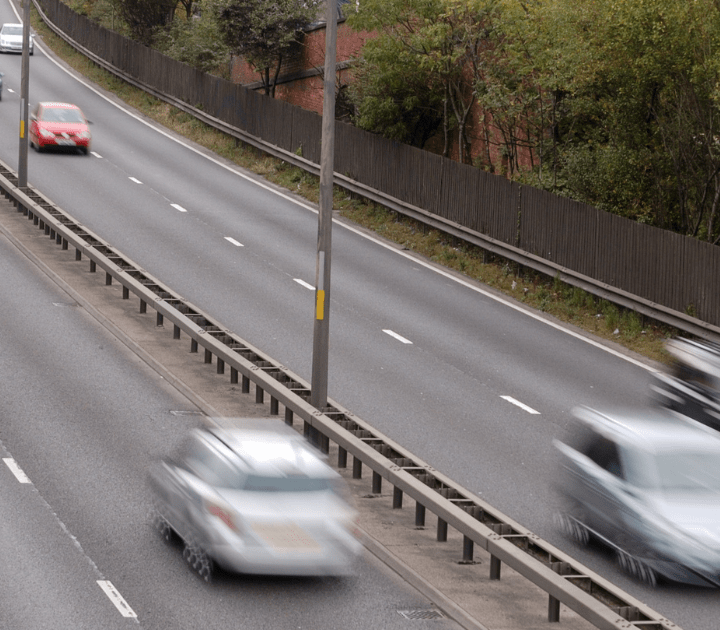
Dual Carriageways and Single Lanes: What You Need to Know
Learn the difference between dual carriageways and single lanes, including speed limits, rules, and guidance, and whether learner drivers are allowed.
Since June 2018, new rules for learner drivers have allowed them to drive on motorways in England, Scotland, and Wales under specific conditions. For many learner drivers, the idea of navigating these high-speed roads can be intimidating. With multiple lanes, high speeds, and numerous rules to follow, the motorway might seem overwhelming. However, gaining experience on these roads with the help of an approved driving instructor can make a significant difference. This guide will not only explain motorway rules for learners but also address common questions like “Can learners drive on dual carriageways?” and “Why are learners not allowed on motorways in some cases?”.
Yes, learner drivers can drive on motorways with a provisional licence, provided they are accompanied by a DVSA-approved driving instructor and in a dual-controlled vehicle. Learners are not allowed on motorways when practising driving with a friend, family member or guardian. This change in legislation aims to help learners build confidence and experience in a controlled and safe environment. However, this does not extend to other high-speed roads like dual carriageways where learners are allowed to drive, like any other road, just as long as they are supervised by a driver that is at least 21 years old and has been driving for 3 or more years and the vehicle is insured (could mention learner insurance). Driving on the motorway can seem daunting due to higher speeds and more complex road systems, but under the guidance of an experienced, suitable driving instructor, learners can become proficient in motorway driving, making them more prepared for their driving test and independent driving thereafter.
Can learner drivers go on dual carriageways?
Yes, but the rules differ. Unlike motorways, learners can practise on dual carriageways with a supervising driver who meets the criteria for accompanying learners (e.g. over 21 years old with a valid licence for at least three years). However, for motorway driving, supervision must be by a DVSA-approved driving instructor in a dual-controlled vehicle.
Before the government introduced legislation back in June 2018, provisional licence holders could not drive on motorways. Thankfully, this changed to allow learners to get the level of experience they want, especially if they’re going to find themselves on the motorway as a new driver.

To go on the motorway as a learner driver, you must be accompanied by a DVSA approved driving instructor. Learners are not permitted to go on motorways with trainee driving instructors or someone who is over 21 years old with a valid driving licence for three years, like you ordinarily can when driving on A-Roads.
No, you do not need to take driving lessons on the motorway and motorway driving is not included in the driving test. If you think you would benefit from learning to drive on the motorway, speak to your driving instructor. Practising on the motorway can help you with the following:
Grow your ability to drive in different environments
Practise driving at higher speeds with more cars on the road
Boost your confidence for independent driving post-test
Improve your knowledge of the highway code by putting it into practice
If your car, or a family member’s or friend’s, has learner driver insurance, you cannot use it on a motorway
When learning to drive on the motorway, you must be in a dual controlled vehicle. This means you’re approved driving instructor can take control if necessary. If the vehicle does not have an instructor’s rooftop box fitted, it will need L plates on the front and rear.

Source: https://www.gov.uk/government/statistics/road-traffic-estimates-in-great-britain-2023
Yes, provisional licence holders can drive on most roads in the UK when supervised by an appropriate individual or instructor. However, motorways are subject to stricter rules, with learners only allowed to drive on motorways in a dual-controlled vehicle and with an approved driving instructor.
If your car, or a family member’s or friend’s, has learner driver insurance, you cannot use it on a motorway
When learning to drive on the motorway, you must be in a dual controlled vehicle. This means you’re approved driving instructor can take control if necessary. If the vehicle does not have an instructor’s rooftop box fitted, it will need L plates on the front and rear.
To ensure safety, learner drivers must adhere to specific rules when driving on motorways:
Accompanied by an Approved Driving Instructor (ADI): You must be accompanied by a DVSA-approved driving instructor. This means you can’t practise on the motorway with a friend or family member, even if they meet the usual requirements for accompanying a learner on other roads.
Dual-Controlled Vehicle: The car you use must be fitted with dual controls. This setup allows the instructor to take control if necessary, providing an added layer of safety.
L Plates and Rooftop Box: If the vehicle does not have an instructor’s rooftop box, it must display L plates on the front and rear.
A common question is whether learners can use their existing learner driver insurance on motorways. The answer is no. Learner insurance does not cover motorway driving. You can only drive on the motorway in a dual-controlled vehicle with an approved driving instructor. However, learner driver insurance is still valuable for gaining experience on A roads and other types of roads.
This restriction ensures that learners gain experience in a controlled and safe environment. The higher speeds and complexity of motorways require the expertise of a DVSA-approved instructor to prevent accidents and build proper skills.
Motorway driving as a learner can feel overwhelming, but following these tips can make the experience safer and smoother:
Understand Motorway Signs and Speed Limits: Familiarise yourself with motorway signage, lane markings, and typical speed limits.
Use the Slip Road to Build Up Speed: When joining the motorway, accelerate on the slip road to match the speed of traffic, ensuring a smoother merge.
Check Mirrors and Blind Spots Frequently: Always check mirrors and blind spots before changing lanes or merging.
Maintain Safe Distances: Keep a safe following distance, especially at high speeds. Use the “two-second rule” as a guide.
Stay in the Left Lane Unless Overtaking: On UK motorways, the left lane is for regular travel, while the middle and right lanes are for overtaking only.
Avoid Lane Switching: Frequent lane changes can be risky on high-speed roads. Stick to your lane unless overtaking.
Stay Calm in Busy Traffic: Motorways can get congested, so practise staying calm and focused, especially during peak hours.
Following these steps with your instructor’s guidance can help you gain confidence and develop safe motorway habits.
Increased Confidence: Driving at higher speeds and dealing with motorway traffic can boost your confidence.
Better Preparedness: You’ll be better prepared for the variety of driving situations you might encounter once you pass your test.
Understanding Motorway Signs: Familiarity with motorway signs and rules can make future motorway driving safer and less stressful with a greater
More Driving Skills: By driving in more diverse road conditions will allow you to gain more diverse driving experience and skills.
Learning to drive on the motorway can be a crucial part of your driving education, providing you with the skills and confidence needed for safe and independent driving. While it’s not compulsory, many learners find it beneficial to gain this experience before passing their driving test. If you’re unsure about motorway driving, discuss it with your instructor to determine if it’s the right choice for you.
Additionally, consider the benefits of Pass Plus training, a practical course designed for new drivers that covers motorway driving along with other advanced skills. Pass Plus can offer further confidence and competence, helping you become a more skilled and safer driver in various conditions. Taking these extra steps in your driving education can significantly enhance your driving abilities and overall safety on the roads.
Sign up today for exclusive offers, practical guidance, driving tips, and more!

Commonly asked questions about driving on the motorway
Yes, learners can drive on the motorway at night if they are accompanied by an approved driving instructor in a dual-controlled vehicle(this would be dependant on insurance, some insurers have curfews). Night driving can provide valuable experience in different driving conditions.
Motorway lessons may come with additional costs depending on your driving school or instructor. It’s best to check with your instructor for specific pricing.
No, the rules allowing learner drivers to drive on motorways only apply to England, Scotland, and Wales. In Northern Ireland, learner drivers are not permitted on motorways.
Before your first motorway lesson, ensure you are comfortable with general driving skills. Discuss any concerns with your instructor, and make sure you understand motorway rules and signs.
If you feel nervous, communicate with your instructor. They can provide reassurance and gradually introduce you to motorway driving. Building experience at a comfortable pace can help alleviate anxiety.
Yes, but only under the supervision of a DVSA-approved driving instructor and in a dual-controlled vehicle.
Learners can drive on most UK roads, including A-roads and dual carriageways, provided they meet the usual supervision requirements. Motorway driving is permitted only with an approved driving instructor.
Learner driver insurance covers other types of roads but excludes motorways due to their higher risks and specific requirements for instruction.
You will be logged out in seconds. Do you want to stay signed in?